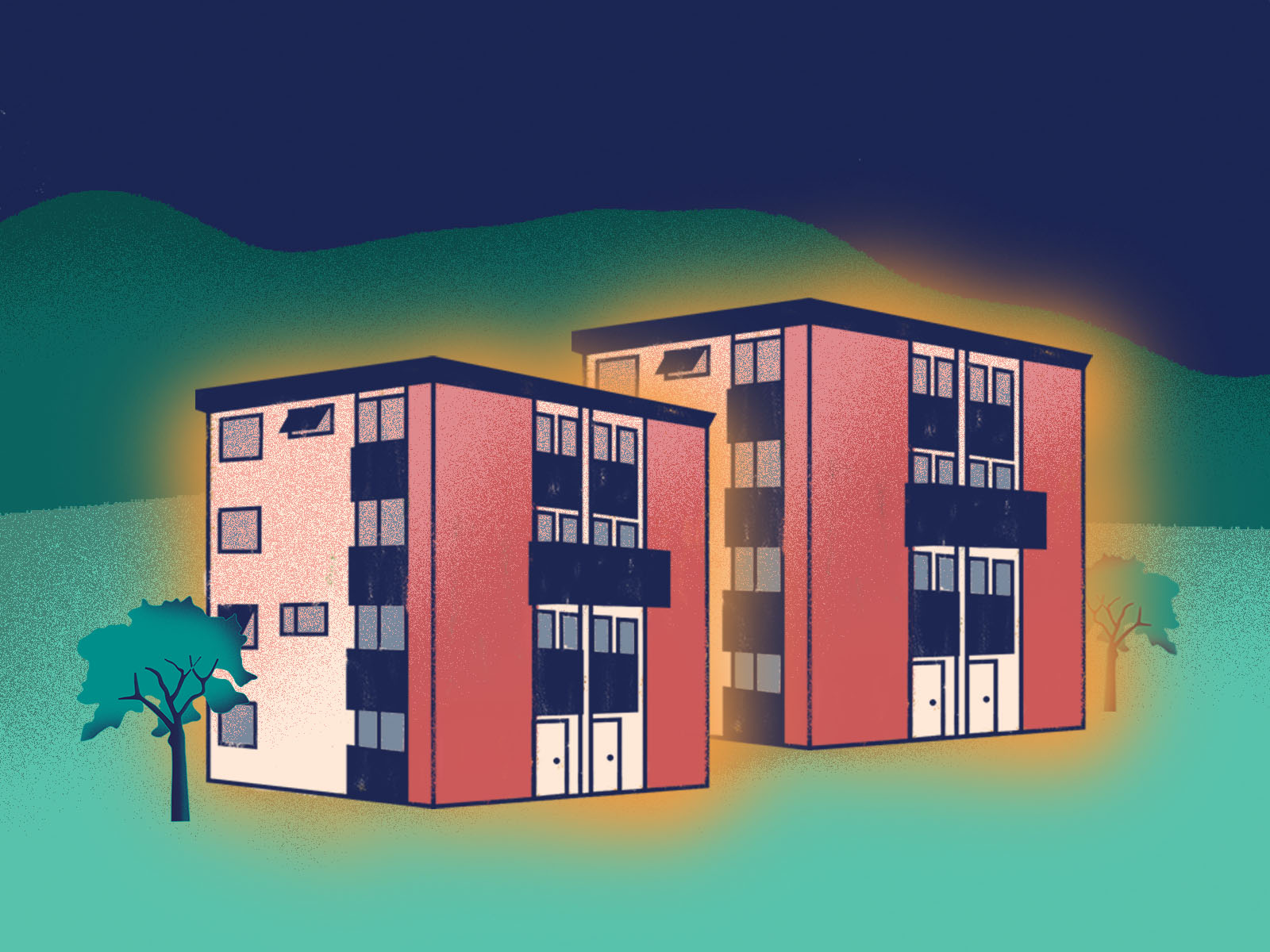20 Sep 2024
How are Actions 10 and 15 tackling the climate crisis?
A third of UK carbon emissions relate to housing, with poor heating systems and inefficient insulation in homes also contributing to fuel poverty. Almost 19 million UK homes have an Energy Performance Certificate (EPC) rating of D or worse (ratings are from A to G). Privately rented homes are among the least energy efficient, and fuel poverty is highest in the private-rented sector. Councils can use their enforcement powers in the private-rented sector to help improve standards, keeping people warm and reducing carbon emissions.
A key factor behind inefficient private-sector housing is the reluctance of landlords to bring homes to the minimum legal standard for energy performance. This may be in part due to ignorance of what the regulations are and of what grants are available, or it may be that a property can't be bought up to minimum standards due to age or other restrictions. However, any improvements would bring benefits to residents, reduce fuel poverty and unlock significant carbon savings.
As the cost of heating homes has risen sharply during the energy crisis, in addition to a wider cost-of-living crisis in which rental prices are also increasing, improving the energy efficiency of the private-rented sector is essential to make sure that renters have access to warm, affordable housing.
“Too many of our residents live in poor standard accommodation and are paying over the odds for gas and electricity because their homes are so poorly insulated. We believe that many landlords are not aware of the new legislation or are choosing to ignore it so we need to take action. It comes at a critical time and could make a difference to the lives of individuals and families who are facing rising fuel and energy costs. Reducing carbon emissions is a priority for the city and every property that is more energy efficient is helping us meet our goal of helping tackle the climate emergency."
Councillor Sarah Doyle, Cabinet member for strategic housing and regeneration.
Legal standards, national targets and council powers
Minimum energy efficiency standards (MEES) were introduced for privately rented homes in 2018. Legislation requires privately rented properties to have a minimum EPC rating of band E. Local authorities are responsible for enforcing the standards and can impose financial penalties on landlords that fail to comply in some way.
In addition, the government has a proposal for the majority of privately rented properties in England and Wales to be brought up to at least EPC band C standard in the period from 2025 to 2028. Local authorities don’t currently have powers to insist on EPC ratings above the minimum legal standard but can encourage and incentivise landlords, including signposting to funding.
What Liverpool City Council is doing
Using the government EPC register data, Liverpool City Council has mapped the energy performance of privately rented homes in the city, with particular attention to those that are rated lowest (F and G), with the aim to improve compliance with regulations.
From this data, it's taking a 2-stage approach:
- Engagement and enforcement campaign targeting landlords in areas with the worst EPC ratings. This is a specific project using funding won through competition and provided by the Department for Business, Energy and Industrial Strategy (BEIS). The project is facilitated through the Midlands Energy Hub.
- Five-year selective licensing designation implemented from April 2022, in 16 (out of 30) council wards. The designation will be used to drive up standards and deal with poor property conditions. The fee income from the scheme will be ring-fenced to finance enforcement operations. This will also involve a review of EPCs.
The data mapping identified that Liverpool’s privately rented homes (which account for 32% of the city’s housing stock) include many ageing, poorly insulated properties with bad heating systems. Only 1 in 3 privately rented properties have an EPC rating of A to C, and many are below the legal standard of E. But the council considers 73% of F- and G-rated privately rented properties to be "improvable".
Engaging with property owners (by April 2022)
The MEES project targeted the worst G-rated properties, with a wider awareness campaign around energy efficiency run from September 2021 to March 2022. The BEIS funding was awarded on the basis that the city would find extensive and creative ways of engaging with the sector.
The project was launched with a press release, dedicated web page and leaflet for wider awareness-raising, as well as communication with owners of targeted properties. Letters were sent to private landlords owning over 300 poor properties, alerting them to regulations and prompting them to either upgrade, claim exemption or seek funding. Following a review of feedback, claims for exemptions and claims for updated EPCs, the city took direct enforcement action against 50+ properties, from issuing compliance notices to potential fines – this was the target number set in the project’s funding application.
Communications included:
- raising awareness of the EPC system.
- providing guidance on how to improve EPC performance (ensuring windows and doors are properly fitted etc).
- making landlords aware of any exemptions that may apply to MEES enforcement.
- running webinars facilitated by a leading local landlord to help get owners on board.
If landlords don't engage or prove action has been taken after receiving 2 letters, the council issues compliance notices and reserves the right to issue a financial penalty. However, this is a last resort as the authority is keen that private landlords direct their finances into energy-efficiency improvements rather than into paying fines.
As the programme concluded, the council has directly fed insights into a broader report by the Centre for Sustainable Energy, which also includes learnings from other local authorities on tackling MEES in the private-rented sector.
Licensing scheme (until April 2027)
Liverpool City Council is using a proactive licensing scheme to improve the condition of rented properties in parts of the city where home energy efficiency is at its worst. This includes both mandatory HMO (houses in multiple occupation) and selective licensing properties.
The council previously ran a citywide selective licensing scheme between 2015 and 2020. This required all privately rented properties in Liverpool to be licensed. To be granted a licence, properties had to be suitable for occupation and comply with conditions relating to fire safety and other hazards, but the licensing scheme didn't include energy-efficiency measures at that stage. By the end of the period, there were over 10,000 licence holders and nearly 52,000 properties licensed.
The introduction of MEES regulations in 2018 prompted the council to consider how the standards could be enforced locally, and how this could contribute to climate action efforts set out in Liverpool’s City Plan.
Without a substantive licensing scheme, the council had to receive and respond to an official complaint from tenants or their advocates about their EPC rating before officers could arrange a house visit. But tenants themselves can sometimes be difficult to engage with on EPCs, denying access or fearing retaliatory eviction should they make a complaint about their landlord.
In December 2021 the council’s application for a new selective licensing designation based on poor housing conditions was approved by the government. This was introduced on 1 April 2022 and runs until 31 March 2027, covering 16 of 30 council wards, 45,000 properties and 80% of the city's private-rented sector. Many of these properties have poor energy efficiency alongside other potential serious hazards.
The council is including EPC inspections in its checks on compliance with licensing conditions. The approach has been informed by the MEES project outlined above, which ended as this new selective licensing scheme began.
By creating a consolidated approach with enforcement powers, the council can have a greater impact in tackling non-compliant landlords, while also creating positive relationships with landlords to make private renting safer and more comfortable for tenants. An intelligence-led approach allows local authorities to identify and take the strongest action on non-compliant landlords.
The maximum licence fee is £570 per property, with new landlords or landlords accessing an early bird rate paying a discounted fee of £400 per property, as well as a further reduction for properties with an EPC rating of C+.
Encouraging higher standards of energy efficiency
By building relationships with landlords, the council can also encourage them to go above minimum legal standards.
Other incentives include offering landlords with EPC ratings of C+ a further £50 discount per property. As before, income through this route will be ring-fenced to cover staffing costs used directly on inspections and the administration of the scheme.
What impact has the project had?
Liverpool's MEES engagement and enforcement project identified 1,960 properties with an EPC rating below E.
The authority identified 471 properties that required targeted action within the context of the BEIS-funded project. 164 properties improved to an EPC rating of E or above. Follow-up letters were sent to 310 properties.
Following the 2 engagement letters, around 200 properties were still non-compliant and of these, 50+ were identified for more formal enforcement action, starting with the issue of compliance letters in January 2022. This may lead to the issuing of penalty fines.
There’s been a significant response from landlords to the new licensing scheme, with the council receiving approximately 20,000 applications in the first 3 months.
What made this work?
Engagement and education are critical
The council prioritised proactively engaging landlords. It invested in a range of communication tools including press releases, a website, leaflets and webinars. It also got messages out through partner networks to tenants and resident groups.
Moreover, ahead of the new selective licensing designation starting in April 2022, there was significant communication and engagement with potential licence holders, tenants, partners and other stakeholders in the targeted areas.
"If we can improve housing and build a better relationship with private landlords, we will have a vibrant private-rented sector that is more attractive to invest in and to live in, with more sustainable tenancies."
Phillip Stanley, Private Sector Housing, Liverpool City Council.
A range of benefits
A strong driver in enforcing the standards was the potential benefits to mental and physical health, as well as the economic savings that can reach those living in poor conditions or those in fuel poverty.
For example, an F-rated property could cost twice as much to heat as an A-rated property, and a G-rated property 3 times as much. The carbon savings delivered by the project also directly related to Liverpool’s City Plan, and this was another key motivation for enforcing MEES.
Key partners
Another key success factor has been a close relationship with Healthy Homes, Liverpool’s council-run fuel poverty service. Healthy Homes shared knowledge of the city’s poorly performing housing where residents are thought to be living in fuel poverty, which enabled targeting of these homes.
The council worked closely with BEIS to gain access to EPC data for properties rated F or G, which were then cross-referenced against Liverpool’s data from its original private-rented sector selective licensing programme. This process allowed 822 properties to be identified. The support from BEIS in processing EPC data offered a very useful starting point for the council.
Both schemes are essential in ensuring that Liverpool’s Council Plan and City Plan are a success by making local areas safer places to live. The council reports a closer connection to landlords following implementation of both programmes, which is a key aim as part of Liverpool’s ambition to attract investment into the city.
What resources were needed?
Liverpool City Council received £70,000 of funding from BEIS to undertake its MEES project up to March 2022. The funding was won in a competition facilitated by the Midlands Energy Hub.
There's no additional funding for the licensing scheme, which is intended to be cost-neutral.
Both projects are led by Liverpool City Council Private Sector Housing Service, which is responsible for all housing licensing and enforcement functions.
Lessons from Liverpool
Liaising with other council departments and legal complexities
MEES legislation is complex, and regulations can overlap with existing legislation such as the Housing Health and Safety Rating System. This can cause different council departments to disagree on the correct interpretation of the legislation.
It's important to work with internal departments, such as multiple housing teams and trading standards, to set a clear policy and objective, understanding that each department has different priorities among the many social issues facing private tenants.
Although the government has shown confidence in Liverpool by approving a significant licensing scheme, the regulatory landscape is complex with different legislation and powers. This has been acknowledged in a recent National Audit Office report. As part of its reporting on the new licensing scheme, Liverpool will be reporting to government as well as providing regular public-facing reports on progress.
Learnings from the first round of licensing projects
The council learned from its first private landlord licensing programme in 2015-2020 that positive engagement should be the priority. It's better to provide information and support to landlords, while using examples of good practice within the sector to encourage action. This can reduce time and money spent on compliance issues further down the line.
Having a previous licensing programme in place offered a good starting point to implement MEES as officers had more comprehensive data to begin with.
Enforce MEES through Environmental Health
Over the longer term, the council intends to roll out the enforcement of EPC legislation within the Environmental Health team – ensuring a more joined-up approach. By using Environmental Health Officers to enforce MEES, the council will be able to identify further property defects, meaning enforcement action can also be delivered to address more conventional hazards such as damp and mould growth, which are given higher priority in legislation.
More time is needed
Collecting accurate data in the private-rented sector was both complex and time consuming, with multiple data sets all containing some inaccuracies, meaning the council had to put extra effort and time into cross-referencing EPC data. Longer time frames for delivering MEES would allow for a specialist programme to be set up, while allowing local authorities to arrange more resource to support wider enforcement. BEIS should learn from Liverpool’s experience by giving councils in receipt of new private-rented sector enforcement funding more time for delivery.
Liverpool City Council did learn that compliance notices can be generated and sent in bulk before properties need to be physically visited, and this allowed the team to enact more interventions than would've been possible if each property had to be visited.
The need for EPC reform
Through the process of enforcing MEES, the council stated that EPCs require reform to make them easier to navigate by officers. The council was able to identify many properties with either fraudulent or poor-quality EPC ratings.
On top of this, the strong focus in EPC guidance on gas-based heating systems means that there’s little support for heat pumps. With EPC legislation pushing landlords to improving ratings to grade C and above by 2025, reform of EPC assessments, ratings and guidance is required to improve the delivery of MEES enforcement.
Useful information
Related projects
We've found some examples of other council activity on this topic.
- Oxford City Council is introducing new measures to ensure landlords meet the minimum safety and energy efficiency standards.
- Shropshire Council has also received BEIS funding to improve energy efficiency in the private-rented sector.
Friends of the Earth's view
This is a great example of a council acting on the powers it has now. Liverpool is ahead of most councils in targeting fuel poverty in the private-rented sector. With a large take-up of the council’s licensing scheme, we expect to see the impact increase in terms of numbers of houses improved.
The UK government has promised to improve housing standards in the private-rented sector, but councils shouldn't delay taking their own action, especially with energy price rises and rent increases leaving more people struggling to heat their homes. Councils should also improve standards of energy efficiency in social housing (Action 13) and help owner-occupiers (Action 24 of the Climate Action Plan).
Friends of the Earth is showcasing specific examples of good practice in tackling climate change, but that doesn’t mean we endorse everything that council is doing.
This case study was produced by Ashden and Friends of the Earth. It was originally published in February 2022 and was last updated in January 2023. Any references to national policy in this case study relate to policy under the previous government and reflect the policy context in which the council was operating at the time.





